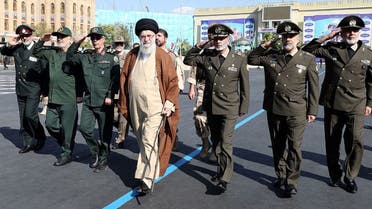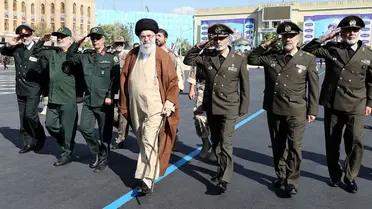February 3, 2024

A handout picture provided by the office of Iran’s Supreme Leader Ali Khamenei shows him (C) arriving at a joint graduation ceremony for cadets from armed forces academies in the Iranian capital Tehran on October 10, 2023. (AFP)
Iranian leadership is resisting direct military confrontation with the US, despite recent provocation and escalating tensions. President Joe Biden’s preference for diplomacy hasn’t yielded the intended results, with the 2015 nuclear deal remaining elusive.
The recent drone attack near the Jordan-Syria border, attributed to Iran-backed militias, has reignited debate in the US, with some advocating for strikes on Iran. There are divergent viewpoints on the appropriate response, with some advocating for targeted strikes to restore US deterrence, while others urge restraint and emphasize the risk of further escalation.
Analysts believe that Biden is unlikely to launch a direct attack on Iran, citing a potential focus on Iran-linked targets in Syria and Iraq. Iran’s historical reluctance to engage in direct conflict with the US is rooted in its focus on self-preservation. Supreme Leader Ali Khamenei prioritizes regime stability, as evidenced by Iran’s measured response to past provocations, such as the killing of Qassem Soleimani. Despite vowing to avenge Soleimani, Iran has exhibited caution, prioritizing stability over forceful retaliation.
The prospect of a US-Iran war is deemed devastating, particularly for Iran, given its military inferiority. Iran’s restrained approach reflects its awareness of the asymmetrical nature of such a conflict. Despite the chest-beating rhetoric, Iran’s strategic considerations indicate a desire to avoid a direct military showdown with the US.
This cautious stance mirrors Iran’s historical approach to geopolitical challenges. By prioritizing regime stability and self-preservation, Iran’s leadership aims to navigate turbulent waters without plunging into a full-scale war. As tensions persist, the global community closely observes the delicate balance between provocation and restraint in this volatile geopolitical landscape.Iran’s Reluctance for War with the US: Analyzing Geopolitical and Domestic Factors
US President Joe Biden has made no secret about his unwillingness to engage in any direct military confrontation with Iran. He has pursued a diplomacy-first policy with Tehran since entering office – a policy that has failed to achieve one of its primary objectives: reviving the now-defunct 2015 nuclear deal.
Yet, following last weekend’s drone attack by Iran-backed militias near the Jordan-Syria border that killed three US soldiers – an attack Biden himself blamed on “radical Iran-backed militant groups” – the American president is facing unprecedented pressure to consider strikes in Iran.
There are two primary camps in the current discourse. One, critical of Biden’s Iran policy even before the recent attack, advocates for targeted strikes on military sites in Iran as the only means to restore US deterrence.
The second camp urges restraint, stressing the risk of greater escalation in a region already engulfed in flames since the October 7 attack by the Iran-backed Palestinian militant group Hamas on Israel. Officials, analysts and observers of this mindset have been suggesting that the key to reducing tensions and halting attacks on US troops in the Middle East is for Washington to pressure its ally Israel into accepting a ceasefire with Hamas, which governs the Gaza Strip.
“I do not believe President Biden will directly attack Iran,” said Saeid Golkar, an associate professor of Political Science at the University of Tennessee at Chattanooga and senior advisor at United Against Nuclear Iran.
Golkar told Al Arabiya English that Biden was more likely to order attacks on Iran-linked targets inside Syria and Iraq instead.
“Based on Biden’s initial reactions and the portfolios of his national security team, I am skeptical that an attack inside Iran will occur,” he said.

US President Joe Biden is briefed on the deadly drone attack at a US outpost in Jordan in the Situation Room at the White House in Washington, US, Jan. 29, 2024. (Handout via Reuters)
Ali Fathollah-Nejad, director of the Center for Middle East and Global Order, agreed that a direct strike by the US on Iranian soil is improbable. He said the US could target Iran-linked sites elsewhere in the region.
An often-overlooked aspect, particularly during periods of heightened tensions between Tehran and Washington, is Iran’s consistent reluctance to involve itself in a full-scale war with the US, despite its public rhetoric.
Since its establishment in 1979 by Shia Muslim cleric Ruhollah Khomeini, the Iranian regime has never engaged in direct military confrontation with the US. This strategic choice stems from the regime’s paramount focus on self-preservation.
“I think [Iranian Supreme Leader Ali] Khamenei wants to avoid a direct war with the United States at all costs as it risks destabilizing his regime, and regime survival is his priority,” Jason Brodsky, policy director at United Against Nuclear Iran, told Al Arabiya English.
During a speech in Tehran on November 16, 1981, Khomeini, the then supreme leader of Iran, underscored the regime’s dedication to self-preservation with a bold statement: “The preservation of the Islamic Republic is more crucial than the preservation of an individual, even if that individual were [al-Mahdi].”
Al-Mahdi holds profound significance in Shia Islam. Twelver Shia Muslims, who make up the majority in Iran, believe he is a descendant of Prophet Mohammed. According to their faith, al-Mahdi has been in a state of occultation for centuries and will eventually reappear alongside Jesus Christ at the “end of time” to eradicate evil and injustice.
By saying that preserving the regime takes precedence over safeguarding al-Mahdi, Khomeini aimed to emphasize the imperative of preserving the regime at any cost.
This mindset explains Iran’s measured response to the killing of its former Quds Force chief Qassem Soleimani, and why his killing didn’t lead to a war despite predictions to the contrary in the first two weeks of January 2020. Despite the significant loss, the regime prioritized stability over a more forceful retaliation.
The recent drone attack in Jordan is arguably the closest Iran has come to fulfilling its pledge of avenging Soleimani.
US-Iran war would be devastating
A US-Iran war would be devastating for both parties and the entire Middle East. However, the anticipated fallout would be more pronounced for Iran, given its military limitations.
“Iran does not want a direct war with the United States. This is because Tehran knows it will lose such a contest as its conventional military forces are no match to US power,” Brodsky said.
On Tuesday, Kataib Hezbollah (KH), an Iraqi militia backed by Iran, said it would halt its attacks on US troops, just hours after Washington vowed to respond to the drone attack in Jordan. The Pentagon said the attack had “footprints” of KH before the White House said the “Islamic Resistance in Iraq” was responsible.
Fathollah-Nejad said that the KH announcement illustrated Iran’s anxiety about potential US retaliatory actions against Islamic Revolutionary Guard Corps (IRGC) positions in the region.
“The KH announcement allows Iran to continue its oft-practiced maneuver of ‘plausible deniability’ when it comes to actions of its regional proxies,” Fathollah-Nejad told Al Arabiya English.
Iran’s domestic politics
Another factor in Iran’s war reluctance is Supreme Leader Khamenei’s advanced age of 84. Succession planning has been one of Khamenei’s top priorities over the past few years. The supreme leader has sought to consolidate power among those ideologically aligned with him. Today, the three branches of government in Iran – the presidency, judiciary, and parliament – are dominated by such individuals.
“Succession is ever-present in Khamenei’s calculations. He wants a smooth succession to install a successor who will protect his legacy and preserve the Islamic Republic,” Brodsky said. “A direct war with the United States would imperil that process, which is ongoing. But Khamenei will pursue indirect conflict with the United States via proxies and push the envelope to the limit.”
In the event of war, the Islamic Republic may also struggle to garner majority support at home, given the widespread discontent with the regime resulting from dire economic conditions and social and political repression.
“The Islamic Republic is aware that it lacks social support. It is an illegitimate and unpopular regime, and there is widespread discontent among Iranians. They know that any war could lead to the collapse of the Islamic Republic,” Golkar said.
Brodsky said that if the US targets regime sites within Iran, Tehran would find a way to retaliate and save face, but the Iranian response would be carefully calibrated to avoid further escalation.
“If the US attacks inside Iran, it would be such a shock to the Iranian system that the regime will transition from its recent risk-readiness to risk-aversion,” he predicted.
– agency report
